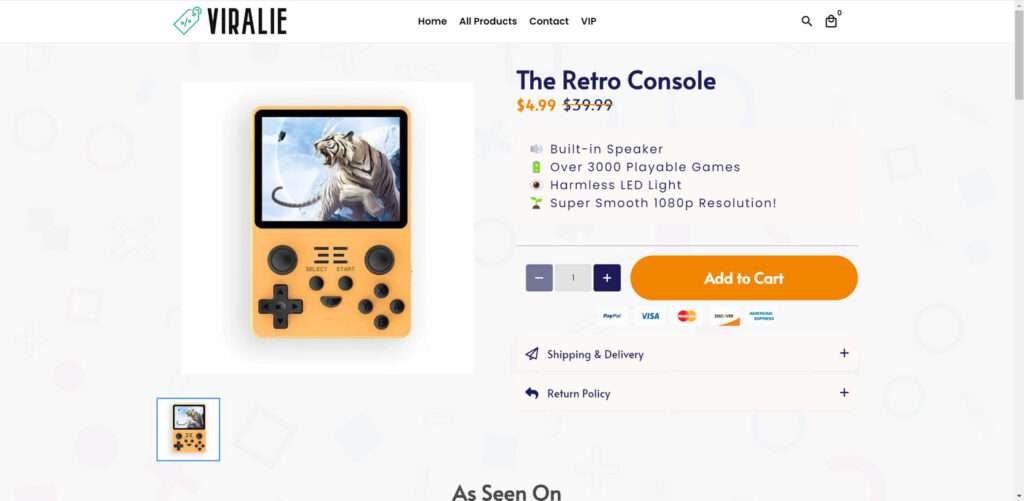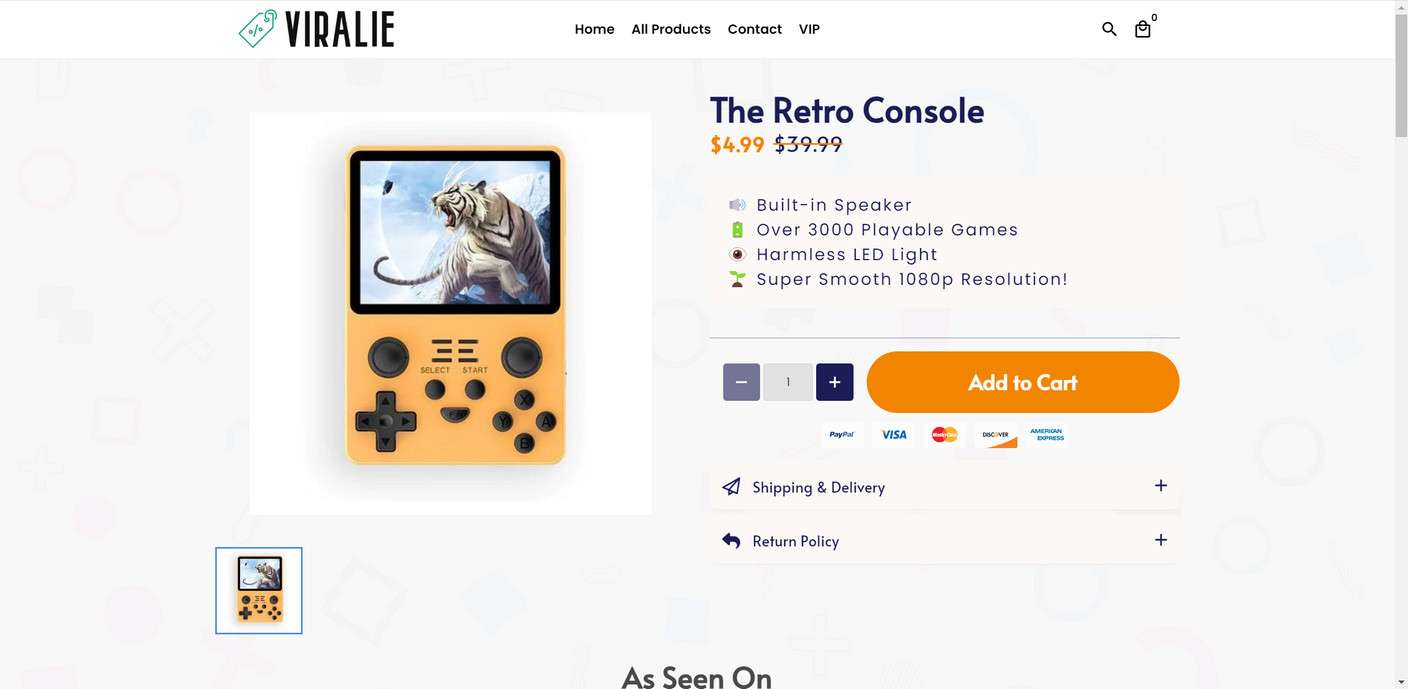Retro gaming consoles like the NES, SNES, Sega Genesis and PlayStation 1 provide a huge dose of nostalgia for many people. Those classic games we grew up with are still just as fun and addicting today. So when ads started popping up on social media for a retro console called “The Retro Console” priced at just $4.99, it certainly grabbed people’s attention. But unfortunately, the $4.99 Retro Console deal is a scam designed to prey on nostalgic gamers.
- Overview of the $4.99 Retro Console Scam
- How the $4.99 Retro Console Scam Works
- How to Spot the Scam on Facebook
- How to Spot the Scam on Instagram
- How to Spot the Scam on TikTok
- Identifying the Scam Website
- What to Do If You Fall Victim to the Scam
- Frequently Asked Questions About the $4.99 Retro Console Scam
- The Bottom Line on the Scam

Overview of the $4.99 Retro Console Scam
The $4.99 Retro Console scam typically begins with Facebook, Instagram or TikTok ads that boast an incredibly low price for the retro console. The ads use eye-catching images of beloved retro games and systems like the original Nintendo, Sega Genesis, PlayStation 1 and more. The accompanying text makes hard-to-resist claims like “The Retro Console is only $4.99 Until Midnight!”
These social media ads are designed specifically to target nostalgic gamers and lure them in with the promise of revisiting their favorite childhood games for practically nothing. The ads frequently mention that the deals are for a “limited time only” to instill urgency in potential buyers.
If you click on one of these $4.99 Retro Console ads, you’ll be taken to a website selling the discounted gaming system. The sites typically have a clean, professional design that helps make them look legitimate. But dig a little deeper and there are some red flags:
- The websites are often recently created domains lacking much online history.
- There is very little legitimate contact information beyond a customer service email address.
- The web pages feature stolen images and copied text taken from other sites.
- There are enticing slogans and high-pressure sales tactics pushing the unrealistic deal.
In reality, these websites are complete scams run by fraudsters. The $4.99 Retro Console deal is totally bogus and designed to steal your money and personal information. Keep reading to learn exactly how the $4.99 Retro Console scam works from start to finish.
How the $4.99 Retro Console Scam Works
Here is a step-by-step breakdown of how the scam typically operates after you click on one of the social media ads for the $4.99 Retro Console:
1. You Click on a Social Media Ad for the Deal
The scam starts with an advertisement on Facebook, Instagram, TikTok or another platform promoting the Retro Console for only $4.99. The ad is designed to grab your attention with eye-catching graphics and nostalgic references to old school consoles and games. The text makes almost unbelievable claims about the price and urges you to act fast before the deal expires.
2. The Ad Takes You to a Fake Shopping Website
Once you click the ad, you are taken to the scammer’s website. The site has a layout similar to a legitimate online retailer, with product images, descriptions, reviews and an easy online checkout process. The site may claim to have limited quantities available to create urgency.
3. You Purchase the $4.99 Retro Console
The website makes it very easy to complete the purchase, often requiring just an email and credit card information. Once you enter your payment details, you’ll receive an order confirmation email thanking you for your purchase.
4. You Are Charged Monthly Subscription Fees
Here is where victims often realize they have been scammed. Although you purchased the Retro Console for $4.99, the fake sites sneakily enroll you into a monthly subscription plan without your consent. The fine print on the site mentions these hidden fees, but most people overlook it. You’ll continue to see monthly charges of $49.96 or more per month.
5. No Console Ever Arrives or It’s Very Low Quality
After being charged the subscription fees, victims never receive the $4.99 Retro Console. If you do receive a product weeks later, it will be a very cheap counterfeit console, not at all what was pictured and described online. Either way, you ended up paying much more than $4.99 in the end.
6. Scammers Are Impossible to Contact
You try to call, email or contact the company to cancel your subscription or get a refund, but you’ll quickly find they have vanished. The site provides no legitimate contact information. Emails from the addresses given go unanswered. The scammers have already moved on to their next victims.
By following these steps, scammers are able to generate huge profits through these $4.99 Retro Console scams on social media. The low price gets people in the door, but they ultimately walk away with your money and information.
How to Spot the Scam on Facebook
Facebook’s massive userbase and sophisticated ad platform make it a prime target for scammers promoting the $4.99 Retro Console scam. Here are some tips to help identify their Facebook ads and posts:
- Check the URL – Hover over any links in the Facebook post or ad. The URL should match the company name being advertised. Scam links will typically show unusual or unrelated domains.
- Research the Page – Click on the Page name that sponsored the ad. Review all available info like number of followers and past posts. Newly created Pages with generic content are red flags.
- Too Good to Be True – Extremely low prices on coveted retro consoles are always suspect. Legitimate sellers would not be able to profit selling at just $4.99 per console.
- Limited Availability – Scam ads will claim there is only a certain amount left at the special price. This tries to create false urgency to purchase before you properly research.
- Spelling and Grammar – Sloppy writing with noticeable typos is common for scammers. The ads are hastily put together with little proofreading.
- Images Seem Off – Scammers steal product images off other sites, so they may look distorted or disconnected from the text claims. Reverse image search any photos that seem suspicious.
- Report Suspicious Ads – If an ad seems questionable, use the options provided by Facebook to report it as a scam, false advertising or spam.
Stay vigilant against unbelievable deals on retro consoles in Facebook ads or posts. Use these tips to identify and report suspicious listings to keep your information and money safe.
How to Spot the Scam on Instagram
Like Facebook, Instagram is flooded with fake ads and posts promoting the $4.99 Retro Console special offer. Here is how to analyze Instagram listings and spot the scammers:
- Account Age – Check how long the account has been active. Newly created accounts are untrustworthy. Scammers constantly churn out new profiles.
- Follower Count – Genuine popular brands will have follower counts in the thousands or millions. Scam accounts often have minimal followers.
- Comments Disabled – The scam accounts block users from commenting on posts to avoid exposures in the comments.
- Sales Pitch in Bio – Scammers use the profile bio purely to pitch the deal rather than provide legitimate business info.
- Reposting Real Brands’ Posts – Scammers may repost images of real retro console brands’ Instagram posts then tag the brand to make the account seem credible.
- Link in Bio – The link in the profile bio likely goes to an outside scam website, rather than an Instagram shop or real company site.
- Report Suspicious Accounts – Use Instagram’s reporting tool on profiles and posts that seem like scams to have them reviewed.
Analyzing key account factors helps reveal Instagram scams for retro consoles. With vigilance, you can identify and report the suspicious listings to keep the community safe.
How to Spot the Scam on TikTok
On TikTok, scam accounts try to promote their $4.99 Retro Console deals using engaging video ads. Here are some things to look for:
- No Hashtags – Legit brands use hashtags for discoverability. Scams won’t include relevant gaming hashtags.
- Stock Video Clips – Scammers steal clips off Youtube instead of creating unique content. The videos are unrelated to the deal.
- Link in Bio/Comments – Accounts beg viewers to click the link in their bio or comment for more info on the deal.
- Bot Followers and Likes – Scam accounts use bot services to inflate follower counts and likes to seem credible. But engagement is near zero on posts.
- Repetitive Commenting – Multiple spam comments on the video will hype up the deal using similar text like “This is crazy!” “I want this so baddd”.
- Profile Photo Unrelated to Brand – Scammers won’t bother setting a profile photo matching the Retro Console brand being advertised.
- Report Suspicious Videos – Use TikTok’s reporting system to label any videos that look like potential scams to have them reviewed.
With TikTok videos, always dig deeper into the account, engagement, captions, and quality of content before clicking advertised links. Stay vigilant against scams when deal seem too good to be true.
Identifying the Scam Website
When you click on one of the social media ads promoting the $4.99 Retro Console, you are taken to the scammer’s website that fraudulently claims to sell the discounted gaming system. Here are some tips for analyzing the site and identifying it as a scam:
- Domain Name – Scam sites typically use a recently registered domain name often unrelated to the product. Search the domain on Whois.com to see when it was created.
- Contact Information – Legitimate businesses display a phone number, physical address, and management contact info on their website. Scams only provide an email.
- About Us – Scam sites lack an “About Us” page, company history, or any background details. The focus is only on taking orders.
- Third-Party Seals – Scammers may include fake trust badges or security seals copied from other sites to appear legit. But the seals are meaningless.
- Spelling/Grammar Errors – Poor English and blatant misspellings throughout the site demonstrate lack of a professional team behind it.
- Stock Images – Scammers won’t bother with unique product photos. They steal or borrow stock images unrelated to the actual products.
- Reviews – Fraud sites may have extremely positive reviews, but on closer inspection the reviewers lack real profile photos and have generic names.
- Pressure to Buy – Aggressive sales language urges immediate purchase and warns stock is running out. This creates false urgency.
Follow these tips when evaluating any unknown website advertising unbelievable deals on retro consoles. Identifying multiple red flags can confirm your suspicions and help you steer clear of the scam.
What to Do If You Fall Victim to the Scam
If you unfortunately fell prey to the $4.99 Retro Console scam, here are some important steps you should take right away to limit the damage:
1. Contact Your Bank and Dispute the Charges
Contact your bank or credit card company immediately. Report the fraudulent charges from the Retro Console scam. Dispute them as unauthorized purchases. Providing order emails and site screenshots can help in reversing the charges.
2. Watch for Additional Unauthorized Charges
Keep a close eye on your credit card and bank statements over the next few weeks. Scammers may attempt additional small charges you could easily miss. Dispute any further unauthorized fees.
3. Change Account Passwords
Even without making an actual purchase, simply entering your personal information on the scam sites can be dangerous. Change your passwords immediately for all online accounts, especially your Amazon, Paypal or eBay accounts tied to the scam.
4. Cancel Recurring Subscriptions
If you see recurring subscription fees from the Retro Console scam on your statements, contact your card issuer to block and cancel those automatic payments. Have charges reversed and subscriptions terminated.
5. Report the Scam Website
Look up the domain registry for the Retro Console scam website you ordered from. File a scam and abuse report so they can potentially take down the site before others get ripped off.
6. Warn Others About the Scam
Post on social media and contact your friends to make them aware of this predatory Retro Console scam. Share your experience so they can avoid it. Report the Facebook, Instagram and TikTok ads you saw as fraudulent to get them deleted.
By taking these steps quickly, you can limit the damage from the $4.99 Retro Console scam and prevent further abuse. If significant fraudulent charges were made, you may need to consider canceling and replacing your credit card altogether to keep the account secure.
Frequently Asked Questions About the $4.99 Retro Console Scam
Many people have questions about the shocking social media ads promoting the Retro Console for just $4.99. Here are answers to some of the frequently asked questions about this widespread scam.
What is the $4.99 Retro Console scam?
This scam involves online advertisements on social media platforms like Facebook, Instagram and TikTok that offer very low prices on a retro gaming console called the Retro Console. The ads are designed to lure in customers with unbelievable deals, then steal their money and personal information through fake websites.
How does the $4.99 Retro Console scam work?
The scam starts with an enticing ad promoting the Retro Console for only $4.99. When users click the ad, they are sent to a scam website disguised as a legitimate online retailer. After entering payment information, victims are actually subscribed to expensive monthly subscription plans they never approved.
Are the websites selling the $4.99 Retro Console real?
No, the websites are completely fake and set up solely to scam users out of their money. They use stolen images and graphics to appear like real gaming retail sites. The sites provide little legitimate contact information beyond an email address that goes unanswered.
What happens after I order a $4.99 Retro Console?
You will likely receive an order confirmation, but no console ever ships. Or you may eventually receive a very cheap, poor quality counterfeit console unlike what was advertised. Meanwhile, hidden monthly subscription fees of $39.99 or more appear on your credit card statements.
How can I get my money back if I was scammed?
Immediately call your bank or credit card company to dispute the unauthorized charges. Provide any emails or screenshots as evidence of the scam. Also cancel any recurring monthly subscriptions tied to your card from the fake sellers. Unfortunately, the scammers themselves can rarely be contacted or held accountable.
How can I identify the $4.99 Retro Console scam ads?
Scam ads tend to be newly created social media accounts often with few followers or likes. They use urgency tactics and fake scarcity claims around the deal. Searching the associated websites reveals many red flags like stock images and lack of real contact info.
How can I avoid the $4.99 Retro Console scam?
Simply remember that unbelievably low prices on coveted gaming consoles are always too good to be true. Only shop for electronics from reputable retailers that you trust. For retro consoles, buying locally secondhand offers more fraud protection. And never enter your payment details onto unfamiliar sites.
What should I do if I see a $4.99 Retro Console scam ad?
If you come across one of these scam ads, report it immediately to the social media platform being misused, whether Facebook, Instagram, TikTok or others. Look up the registry info for scam websites to file abuse reports to get them taken down.
By watching for warning signs in advertised deals and evaluating sites carefully, you can avoid falling victim to the $4.99 Retro Console scam. Remember to trust your instincts – if an offer seems unrealistic, it almost always is.
The Bottom Line on the Scam
Nostalgia can be a powerful sales motivator, which is exactly why scammers have focused heavily on retro gaming consoles in their social media scams. Unfortunately, unbelievable deals like a $4.99 Retro Console are always too good to be true.
These scams play on people’s fond memories of older gaming systems using convincing social media ads. But the websites are purely fraudulent, stealing your money while delivering nothing even close to what was promised. Don’t let nostalgia cloud your judgment – if a deal seems unrealistic, it almost always is.
Stick to trusted retailers if looking to revisit retro consoles. Or better yet, buy secondhand systems from local sellers you can meet in-person. That Retro Console for $4.99 would be awesome. Just not when it ends up costing you a whole lot more from an online scammer hiding behind the guise of nostalgia.




